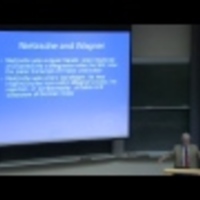Nietzsche on Power, Knowledge and Morality
Dublin Core
Subject
Description
Foundations of Modern Social Thought (SOCY 151)
Today we take a bridge into the twentieth century, constructed by Nietzsche, Freud, and Weber's critical theory. Each author is different in important ways, but they also agree on two crucial points: we must subject our consciousness and assumptions to critical scrutiny and, along with increasing liberation and rationalization in some ways, modern society also has repressive elements. Nietzsche is the oldest of these thinkers; he dies in 1900 and stops working a decade before due to mental illness. While he was ill, his sister, a proto-Nazi and associate of Hitler, cared for him. Her control of his papers and how they were released to the public painted him as a proto-Nazi himself, but reading his whole oeuvre illuminates that Nietzsche subjected Judaism and Christianity to the same scrutiny. In The Genealogy of Morals, Nietzsche attempts to use the genealogy method to be critical of modern morality without taking a certain vantage point. We discuss most specifically his genealogy of the ideas of good and bad and of good and evil.
00:00 - Chapter 1. Nietzsche, Freud and Weber and The Problem of Modernity
10:23 - Chapter 2. Nietzsche in a Historical Context
25:35 - Chapter 3. Nietzsche's Major Works
33:21 - Chapter 4. Major Themes in "On the Genealogy of Morals"
Complete course materials are available at the Yale Online website: online.yale.edu
This course was recorded in Fall 2009.
Today we take a bridge into the twentieth century, constructed by Nietzsche, Freud, and Weber's critical theory. Each author is different in important ways, but they also agree on two crucial points: we must subject our consciousness and assumptions to critical scrutiny and, along with increasing liberation and rationalization in some ways, modern society also has repressive elements. Nietzsche is the oldest of these thinkers; he dies in 1900 and stops working a decade before due to mental illness. While he was ill, his sister, a proto-Nazi and associate of Hitler, cared for him. Her control of his papers and how they were released to the public painted him as a proto-Nazi himself, but reading his whole oeuvre illuminates that Nietzsche subjected Judaism and Christianity to the same scrutiny. In The Genealogy of Morals, Nietzsche attempts to use the genealogy method to be critical of modern morality without taking a certain vantage point. We discuss most specifically his genealogy of the ideas of good and bad and of good and evil.
00:00 - Chapter 1. Nietzsche, Freud and Weber and The Problem of Modernity
10:23 - Chapter 2. Nietzsche in a Historical Context
25:35 - Chapter 3. Nietzsche's Major Works
33:21 - Chapter 4. Major Themes in "On the Genealogy of Morals"
Complete course materials are available at the Yale Online website: online.yale.edu
This course was recorded in Fall 2009.
Source
http://youtu.be/ALiZkclxdko
Publisher
Date
2011-03-05T04:56:22.000Z
Rights
Moving Image Item Type Metadata
Imported Thumbnail
https://i.ytimg.com/vi/ALiZkclxdko/default.jpg
Files
Collection
Citation
“Nietzsche on Power, Knowledge and Morality,” Open Educational Resources (OER) , accessed February 7, 2026, http://oer.uinsyahada.ac.id/items/show/77.


